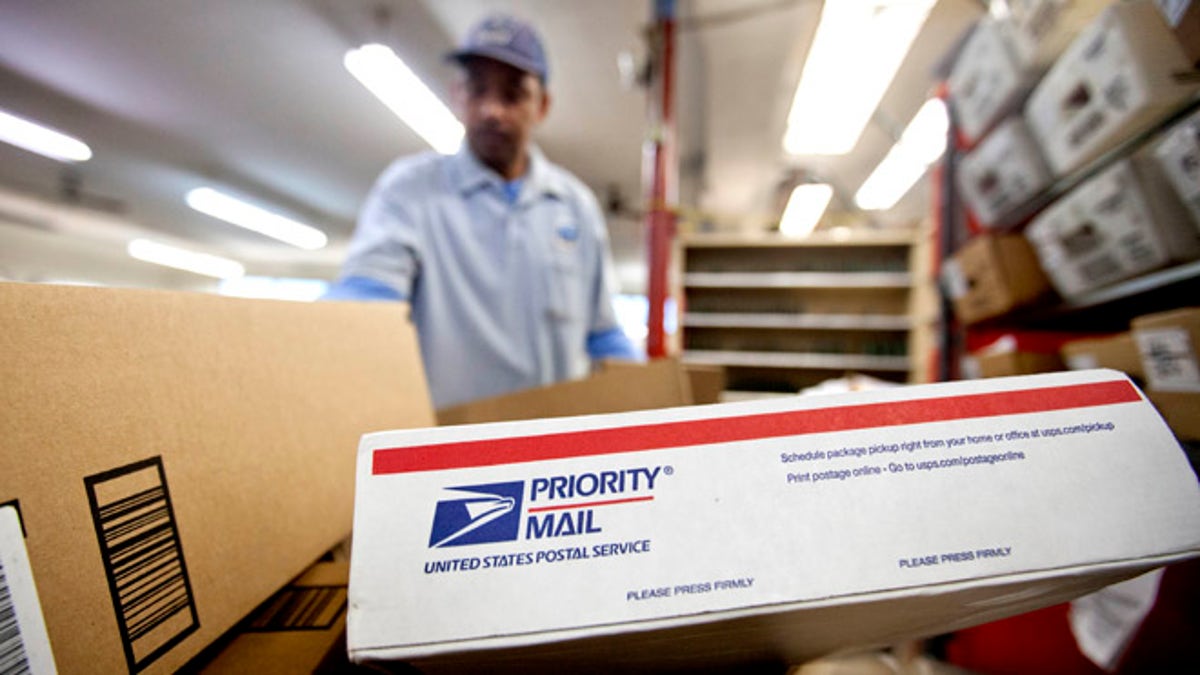
Feb. 7, 2013: In this file photo, packages wait to be sorted in a Post Office as U.S. Postal Service letter carrier Michael McDonald, gathers mail to load into his truck before making his delivery run, in Atlanta. (AP)
WASHINGTON – The financially struggling U.S. Postal Service is revamping its priority mail program to raise revenue and drive new growth in its package delivery business.
The agency is now offering free online tracking for priority mail shipments, free insurance and date-specific delivery so customers know whether a package will arrive in one, two or three days.
Postal officials said Wednesday they expect the changes to generate more than $500 million in new annual revenue. The changes -- including redesigned boxes and envelopes -- are effective immediately.
The improvements come as the Postal Service is reeling from losses this year totaling $3.9 billion. The agency has been trying to restructure its retail, delivery and mail-processing operations, but says its financial woes will worsen without help from Congress.
The changes to priority mail will help the Postal Service better compete with rivals FedEx and UPS in the increasingly lucrative area of shipping products purchased from online retailers, said Nagisa Manabe, the service's chief marketing and sales officer.
"We're looking at strong underlying growth as Americans increasingly shop online," Manabe said in a conference call with reporters. She estimated the sharp pace of growth would continue "well past 2020."
Until now, priority mail has been advertised as a 2-3 day delivery service, with customers unable to know exactly how long it would take for a parcel to reach its destination. That left too much uncertainty, Manabe said, especially for small businesses. Now, they will know the specific date on which a package will be delivered.
Demand from small business customers also helped convince the agency to offer free insurance, $50 coverage for most priority mail shipments and $100 coverage for priority mail bulk orders shippers.
As part of the changes, the service has rebranded its overnight express mail service as priority mail express. That service will still offer $100 of free insurance.
The Postal Service is launching a major advertising campaign to make customers aware of the new changes, including television ads starting next week. Newly designed priority mail boxes and envelopes are already appearing at high-volume post offices, and customers should see them nationwide within the next couple of weeks, Manabe said.
The service has struggled for years with declining mail volume and a 2006 congressional requirement that it make $5.6 billion annual payment to cover expected health care costs for future retirees, something no federal agency does.
The changes announced Wednesday come in one of the areas where the Postal Service can alter its business model without seeking congressional approval. The service would also like to end most Saturday mail delivery, but that has met resistance from federal lawmakers.
"I wish we had the flexibility to make that change," Postmaster General and CEO Patrick Donahoe said Wednesday.
A bipartisan Senate proposal would let the agency end Saturday delivery in a year and make changes that would reduce pensions and retiree health care costs.




